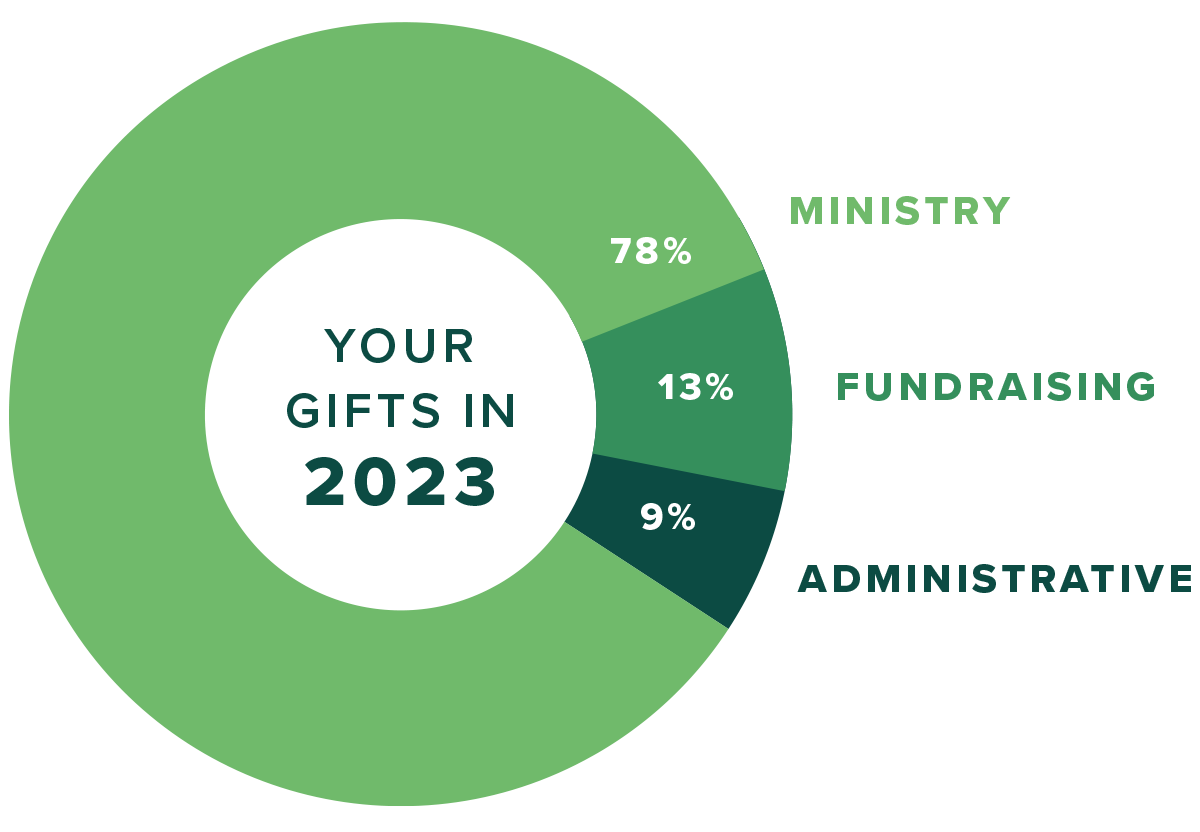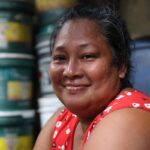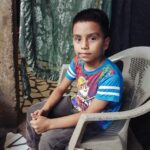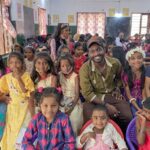Turkana boys who attend Hope Centers in Kenya learn there is more to life than the often-dangerous job of herding livestock. Read how Child Champions help transform these boys’ futures through education.
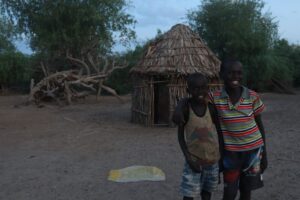
Turkana boys get up early to herd livestock.
The Turkana community is located in Turkana County, 330 miles north of Nairobi, Kenya’s capital. Turkana is hot, sandy, and arid, with temperatures ranging between 68- and 104-degrees Fahrenheit.
The Turkana people are mostly nomadic pastoralists, or herders, and keep animals such as camels, goats, sheep, donkeys, and cows in large numbers. The families and their children live in poverty.
Traditionally in Turkana culture, animals are highly valued because they are the sole source of wealth and livelihood. Apart from them being a source of wealth, animals are still often used in traditions like dowry payment and are also slaughtered during community celebrations.
Conventionally, boys are required to take care of the animals. From birth, boys are believed to be leaders, and as soon as they learn to walk, they are initiated into herding by their fathers.
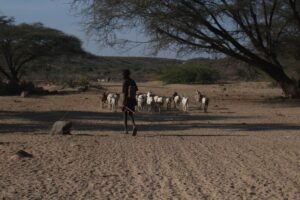
A Turkana boy takes his family’s goats out for grazing and water.
They first accompany their fathers herding, and as they learn they are charged with caring for the goat-kids. As they grow older, boys graduate to herding the rest of the animals owned by the family and their fathers take a break from herding.
On a typical day, boys are usually out herding by 8 a.m. and return home around 6 p.m. As they leave to herd, they are expected to have had their breakfast, which is mostly milk, and are only allowed to carry drinking water and no extra food for the day.
So, while they are out herding, they look for wild fruits in the forests to eat if they feel hungry and are also allowed to take milk from the goats or cows.
It is believed that carrying food as they herd would make them lose concentration, which might lead to the loss of animals.
“Going home with fewer animals attracted severe punishment, so those herding are usually so keen,” says Winstone Jamani, a Child Champion in Turkana. “If one happened to lose an animal while herding, they would be chased away from home to go find it and only return when the animal was found.”
Bandits Threaten Herders’ Livelihoods
Due to Turkana being a hard place, the people herd their livestock miles away from home in search of pasture and water. In good months when light rain has fallen in the area, they go herding in the morning and return in the evening. But in tough months, they could be gone for weeks or even months.
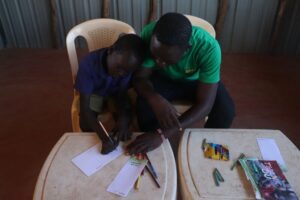
A Child Champion helps a Turkana boy with his studies.
Turkana’s surrounding communities are also pastoralists, and they have a long history of going to war over grazing land and water. They also struggle with banditry.
Winstone says that in addition to being responsible for herding and hunting, boys in his community are taught how to ensure they and the animals are safe.
This involves being taught how to identify each animal by its unique features so that no animal is lost after a day of herding, and how to tell if a herding zone is free from bandits.
“Our neighboring communities have for a long time been hostile, and we have gone into numerous wars with them,” says Winstone. “So growing up, fathers took the initiative to teach the young boys how to tackle and defend the community against raiders. It was an essential skill passed down to generations.”
Unfortunately, banditry has cost some families their fathers or sons, and sometimes women and animals become collateral damage during wars.
Families are also displaced during wars as they run away for safety.
“It takes a single raid for a family to be poor for generations. This is because the only income-generating activity known to the Turkana is pastoralism, yet these same animals attract enemies,” Winstone says.
Education Not Always Embraced
With war being the highest risk for the nomadic pastoralists in Turkana, education has helped the boys dream beyond owning and caring for cattle.
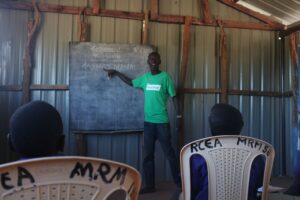
A Child Champion reviews a lesson for kids at the Hope Center.
However, education was largely frowned upon when it was first introduced to the community, and some few still frown at it today.
Alfred Apeyo, another Child Champion in Turkana, says most people in his community perceived education as a long and wasteful route.
“Most wondered why one should spend years in school in the name of looking for knowledge to better their future, yet they would easily acquire wealth, which was animals easily over a short period, and still have a better future,” Alfred recalls.
“Using the long route, yet there was an option for a short route, was a bone of contention for many in the community,” Alfred says. “Most lacked exposure, and to them, the only good life one would ever live was a life of possessing many animals and having status in the Turkana community.”
As education was being introduced in the community, some families slowly tried embracing it, Alfred says. In the late 1990s, some families settled on having only one boy attend school and the rest were made to go herding to keep the families’ source of income stable and to also help fund the education of the one in school.
The one boy who was allowed to attend school was expected to help the whole family once he completed his education.
When education was first introduced in Kenya, it was not affordable to people in hard places. The government has however in recent years introduced free education.
Kids are required to purchase learning materials and school uniforms, pay examination fees per academic term, and also fund their meals while in school.
So even through education was introduced in Turkana to help change children’s future, Alfred says, some people in impoverished communities can’t afford to sustain their kids through education. As a result, some kids never attend school and others drop out.
Helping Boys Achieve Their Dreams
When OneChild set up Hope Centers in Turkana, it was a relief not only to kids who were in school, but to all the families around the Hope Centers.
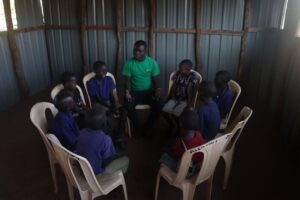
Child Champions emphasize the importance of attending school.
The Hope Centers, through Child Champions like Winstone and Alfred, are helping play a critical role in advocating for the education of boys in Turkana.
Child Champions help keep boys in school because they understand that it is important to not only champion for education among the kids, but it is also important to ensure they stay in school.
As they attend school, sponsored kids are provided with books, school uniforms, shoes, a food basket to use at home, and school fees. Now, the boys whose future would otherwise be pegged on herding, are comfortably attending school.
But beyond being in school, Child Champions in Turkana go an extra mile in guiding them through their journey in life and in education as mentors. They’ve introduced academic clinics for all registered kids in which Child Champions along with a child’s caregiver visit the school and discuss the child’s academic performance with their teachers.
The Child Champions also listen to the child’s dreams and through consultation, guide the child on what areas to work on while in school to achieve their dream.
“The kids need someone to hold their hands, so we are involving their caregivers and also teaching them how to be Child Champions and that is why we have to tag them along as we visit the schools,” says Winstone. “This greatly helps in ensuring that the child is supported not only at the Hope Center but also at the school and home.”
The kids at the Hope Center also share their report cards with their Child Champions.
“We are grateful to everyone that gives so that transformational development can be experienced in our community. We are intentional about making our communities’ future better and that is why we have to hold the kids’ hands and walk closely with them,” Winstone says.
Opening Doors to New Opportunities
Education has, over the years, brought about major changes in the community.
Alfred says that unlike boys who do not attend school, those in school see beyond the animals and look forward to transforming the community.
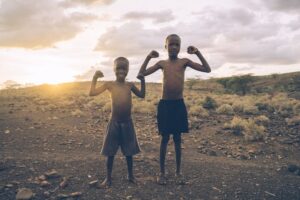
Child Champions’ hope for boys in Turkana is that through sponsorship and education, they can have a better life.
“When the herders lose all their animals to bandits or severe drought, they become angry and bitter because their source of livelihood is no more,” Alfred says.
“This makes most of them violent and they are to left steal from other families to survive. But those in school have learned that there is more to life than animals.”
Acts such as theft and extreme violence have sent some of the boys to jail.
Education has opened up the community to other skills, and most are exploring other professions like teaching, engineering, medicine, and agriculture.
Youths at the Hope Centers have been taught how to prepare a kitchen garden and most of them have shared that knowledge at home and they now have vegetable gardens at home.
“Through education, most have learned that farming is also an excellent source of livelihood, and through irrigation using water from the river Kerio, they can have food for their families and even extra to sell in the market,” Alfred says.
Apart from education transforming the community’s perception as a means of livelihood, it has also in turn helped reduce the rate of dependency in the community.
“When herding was the only economic activity my community knew of, the rate of dependency after a raid was high, and that made more families poorer. But right now, thanks to the skills knowledge in the community, we are optimistic that the dependency syndrome will slowly be a thing of the past once the kids excel in school,” Winstone says.
These two Child Champions’ hope for the boys in Turkana is that, through sponsorship, they can help transform their community’s future today.
Your gift to OneChild’s Partners Fund will be used to open and expand more Hope Centers, serve more kids, and bring hope to hard places.
Be inspired by a prayer for the Turkana people:
We are accountable to the children we serve AND to our donors.
Our accountability to our donors is one of our highest priorities. Our goal is to use the funds entrusted to us as wise stewards. To do this requires continued monitoring of our fund distribution. OneChild is also a member in good standing with the Evangelical Council for Financial Accountability (ECFA)
